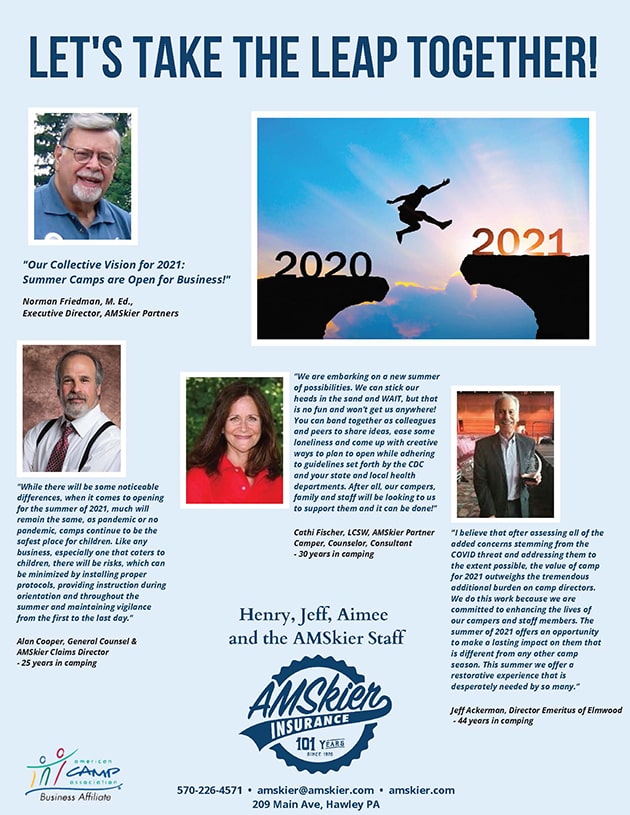The phrase “now more than ever” has become cliché for good reason this year. After experiencing the many negative impacts of the pandemic, campers and staff have an even deeper need for the benefits of camp. But providing the best outcomes of camp will be more challenging this summer as we work within the restrictions of necessary safety precautions. Now more than ever, we as staff need to connect with the purpose of camp.
If you are not emotionally drained and feeling less than well-equipped for the upcoming summer, chances are you have done exceptionally well with your pandemic self-care. Or maybe you thrive on uncertainty and constant invisible threat. Or maybe you have some secret that the rest of us have never heard about — in which case, please share it immediately!
But if you agree that we face a higher level of challenge this summer than in the past, then what can we do about it? First and foremost, we can unite behind the purpose of camp, the reason we do what we do. Put simply, we can connect to our “why.”
Having a strong sense of why inspires our work ethic and initiative, fortifies our resolve, increases our ability to cope, and improves our resilience. If we connect more deeply to the purpose of our work, we will have a more rewarding experience through which everyone in the camp community will benefit — especially the campers.
This idea is not new. Author and speaker Simon Sinek talks powerfully about the why of an organization in numerous online clips (check out The Origin of the Why on YouTube: youtube.com/watch?v=nRaqe9M2DYc). And NC 4-H Camping Specialist and Adjunct Lecturer of Parks, Recreation, and Tourism Management at North Carolina State University Dave Herpy wrote about it last December in an American Camp Association blog (ACAcamps.org/news-publications/blogs/camp-connection/start-why-purpose-camp). To dive deeper into how we accomplish the goal of connecting to the purpose of our work, let’s ask and answer this question: What is the purpose of camp? To help kids grow.
There are many, many good reasons why you may have chosen to take a job at camp this summer. If your number-one reason was not to help kids grow, please consider moving it to that top spot now. Why? Because your campers need you to. Now more than ever, after 15 months of pandemic restrictions and losses, disappointments, and unmet needs, the kids coming to your camp need you to put them first.
The evidence of suffering in children during the pandemic is significant, widespread, inequitable, and well documented (Einhorn, 2020; Levin, 2021). Mental health, academics, and social and emotional learning (SEL) skills have all been negatively affected as opportunities and relationships have diminished for both kids and adults.
The good news is that high-quality camps, more than many other youth development environments, offer a uniquely well-suited experience to support kids. This is because high-quality camps are particularly effective environments for the development of kids’ SEL skills. They also provide:
- A sense of physical and emotional well-being
- Connected relationships with peers and adults
- Space where kids have fun, participate actively, and have the opportunity to make choices and be heard (Westrich & Pope, 2018)
So at this moment in time, when camps can provide what is desperately needed, we have the opportunity for truly meaningful work. We will no doubt have to make some personal sacrifices, putting the needs of our campers and the community in front of our own, but here is why that effort will be worth our while:
- It is rare. In today’s society, not many experiences allow a community of people to intentionally create an environment where specific values are lived — moment to moment — each day. Furthermore, camp is insulated from the competing influences and messaging of the outside world, providing time and space away from both technology and our usual social circles. Face-to-face, interactive, and present, camp can open minds and expand perspectives like few other youth experiences in our digital age.
- It is profound. We, the camp staff, have the power to shape how children view themselves. As we grow up, each of us crafts our self concept as we see it reflected back to us by others. For the most part, it’s a messy process of interpreting and internalizing messages about our value, strengths, and weaknesses — even our worthiness of love. But regardless of how campers feel about themselves when they arrive at camp, as a counselor, you immediately become way cooler than their parents, teachers, or most other “real adults” in their lives. When you reflect their value, strengths, and worthiness back to them, it can affect them profoundly.
- It is both challenging and fun. Few jobs can simultaneously be so genuinely difficult and massively enjoyable. The most rewarding jobs are those in which the challenges you overcome result in feelings of genuine fulfillment and connection. You will have opportunities to grapple with meaningful problems and moments of authentic joy where you are truly present with the people and experiences around you.
- It will help you grow too. The most valuable jobs are those through which we develop personal and professional skills. And at camp you will develop many of the most-sought-after skills in any career field, among them:
- Collaboration
- Problem-solving
- Communication
- Emotional intelligence
- Adaptability
- Resilience
To help kids grow, we role model the positive attitudes and respectful behaviors we hope they will develop. As we embody and practice these attributes on a daily basis, we in turn advance our own personal growth.
By committing wholeheartedly to our jobs this summer, we will support kids at a time when they need it now more than ever. But doing so can also result in the best version of ourselves. It is the caring and support we provide to others that fulfill the deepest needs for connection and meaning in our own lives.
This summer will require a significant amount of sacrifice and commitment, but if you are willing to put the needs of the campers and the community before your own, you will be rewarded many times over. Thank you for working at camp.
Dave Brown is a licensed clinical social worker, trainer, and therapist who works year-round for Mountain Camp, an independent resident camp in Northern California. He presents at regional and national camp conferences, specializing in staff training, leadership, and social-emotional learning (SEL). He lives in Northern California with his partner, two young sons, and overly enthusiastic dog. His favorite new coping mechanism is pickling jalapeños.
Photo courtesy of YMCA Camp Shady Brook, Deckers, CO
References
Einhorn, E. (2020, December 15). Covid is having a devastating impact on children — And the vaccine won’t fix everything. NBC News. Retrieved from nbcnews.com/news/education/covid-having-devastating-impact-children-vaccine-won-t-fix-everything-n1251172
Levin, D. (2021, January 2). How the pandemic has been devastating for children from low-income families. New York Times. Retrieved from nytimes.com/2020/12/29/us/coronavirus-trauma-young-people.html
Westrich, L. & Pope, D. (2018, March 13). Summer camp: A unique environment for social and emotional learning. American Camp Association. Retrieved from ACAcamps.org/news-publications/blogs/research-360/summer-camp-unique-environment-social-emotional-learning




